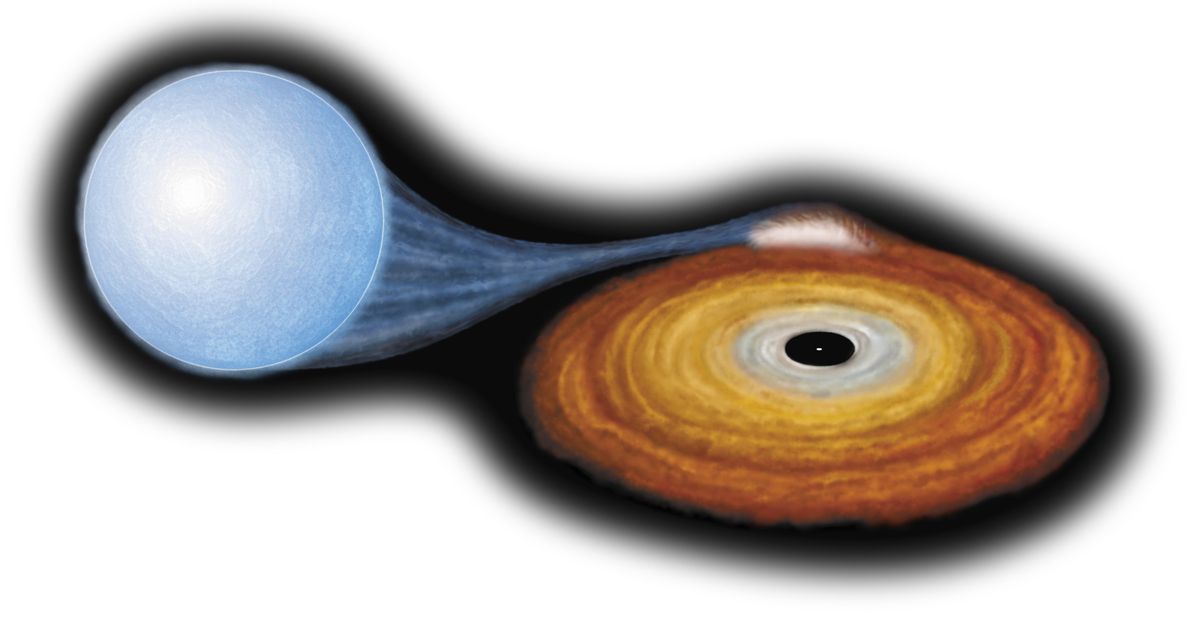Black holes are the most mysterious objects in the universe. One of the most enduring enigmas surrounding black holes is what happens to matter that falls inside. A curious mathematical theory suggests the truth may be stranger than we've ever imagined.
Researchers at the University of California at Berkeley believe that some black holes may erase the past and render uncertain the future of matter that falls inside. Because the laws of physics state that matter nor energy can be created or destroyed, figuring out what happens to material that crosses a black hole's event horizon, the cosmic "point of no return," is one of the biggest mysteries in all of science.
Black holes are formed when the cores of giant stars collapse under their own gravity following a supernova explosion. At the heart of a black hole lies the singularity—a point of infinite gravity and density from which nothing, not even light, can escape. But where does material go after it gets sucked down the cosmic drain?
Classical physics insists is that the singularity itself may be surrounded by an additional event horizon, similar to those around the outer rim of a black hole. This inner barrier is called a Cauchy horizon, and you would end up spending a literal eternity waiting to cross it to reach the singularity inside. This is because time essentially stops inside a black hole due to its infinitely strong gravitational pull.
It's all in the math.
Study author Peter Hintz of the University of California at Berkleley explains in his study, which was published in the Physical Review Letters in January, that some black holes may avoid "cosmic censorship" on anything, or anyone, that falls inside. "No physicist is going to travel into a black hole and measure it. This is a math question. But from that point of view, this makes Einstein's equations mathematically more interesting," Hintz in a statement. "This is a question one can really only study mathematically, but it has physical, almost philosophical implications, which makes it very cool."
Basically, it comes down to the discrepancy between the deterministic nature of relativity and the seemingly non-deterministic environment inside a singularity, where the known laws of physics completely break down. Determinism means that the future can be predicted based on the past. But inside a black hole, due to cosmic censorship, the singularity remains elusive. Incidentally, quantum mechanics also clashes with relativity because of determinism versus non-determinism.
In the quantum world, nothing is certain until it is observed or measured. At the most fundamental level, reality exists in states of potentiality, known as superpositions of uncertainty. Quantum mechanics is the single-most successful mathematical model of the subatomic world ever devised.
Hintz's research, however, says that it probably is possible to cross the Rauchy horizon, due to the accelerating expansion of the Universe. If true, and if we ever figure out a way to test this, it could turn everything we understand about reality on its head. "People had been complacent for some 20 years, since the mid-'90s, that strong cosmological censorship is always verified," Hintz added. "We challenge that point of view." In Hintz's "charged black holes," the past may get erased, leaving any potential future totally unpredictable, while simultaneously granting access to an infinite number of possible futures.
º"A reasonably realistic simulation of falling into a black hole shows how space and time are distorted, and how light is blue shifted as you approach the inner or Cauchy horizon, where most physicists think you would be annihilated. However, a UC Berkeley mathematician argues that you could, in fact, survive passage through this horizon. Animation by Andrew Hamilton, based on supercomputer simulation by John Hawley."
You're probably having a hard time imagining what no past and infinite futures would look or feel like to someone falling inside a black hole, should they survive. Fret not. It's pretty much impossible to conjure an accurate mental image of this.
Click here for more amazing facts about black holes and the Universe.
 COMICSANDS
COMICSANDS percolately
percolately georgetakei
georgetakei secondnexus
secondnexus george's picks
george's picks

















